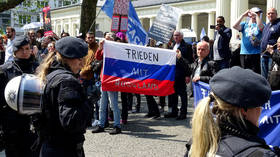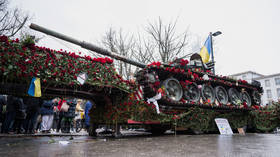Russian narratives gaining traction in Germany – domestic intel chief

Narratives described by German authorities as 'Russian propaganda' are increasingly gaining currency in the country, Thomas Haldenwang, the head of the domestic intelligence service has claimed. This is in no small measure due to the Alternative for Germany (AfD) party, the official believes.
Recent polls have shown the right-wing party having reached its highest level of support in five years.
Appearing on Germany’s ARD TV channel on Monday, Haldenwang said that “Russian narratives are being relayed by parts of this party.” He warned that “right-wing extremism can expand in Germany” and that “Putin’s song is being sung in these circles.”
As an example of such messaging, Haldenwang cited Moscow’s alleged efforts to convince the German public that its military campaign in Ukraine was launched as a result of the West’s infringement on Russia’s own security interests.
According to Haldenwang, “good channels into broader sections of the population” have been established by those pushing supposed pro-Russian narratives. Those peddling such alleged disinformation have found mainstream ways to disseminate it, the intel chief believes.
“In this sense, Russian media is no longer needed, but the German media is adopting these narratives in this environment,” the official asserted.
He went on to accuse Russia of attempting to destabilize German democracy on multiple levels, claiming the country is increasingly under pressure “from various sides, from within and from the outside.”
Meanwhile, on Sunday, Germany’s Bild am Sonntag media outlet published the results of a recent opinion poll indicating that the AfD currently enjoys the support of 17% of the population, the highest since October 2018.
The Green Party, which is a member of the ruling ‘traffic-light’ coalition, is backed by 14% of Germans. The other two members, the Social Democrats and the Free Democrats, garnered 21% and 8%, respectively, in the poll.
If a general election were held now, the coalition would fall short of a parliamentary majority, according to the outlet.
Late last month, Germany’s Federal Office for the Protection of the Constitution declared the Junge Alternative (JA), the youth wing of the AfD, to be an extremist organization.
The JA’s board, in turn, described the decision as an attempt to stifle “every form of authentic opposition.”
Since the start of Russia’s military campaign against Ukraine last February, the AfD has repeatedly criticized Berlin’s anti-Russian sanctions as undermining Germany’s own economy. The party has also called for the end of weapons deliveries to Kiev.













